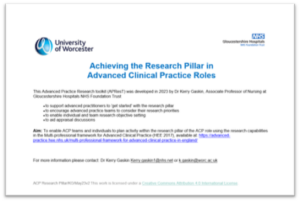In this blog, Dr Kerry Gaskin, Associate Professor of Nursing, discusses the development of an Advanced Practice Research Toolkit to enable AP teams and individuals to plan activity within the research pillar of their role.
There is growing recognition that research active hospitals can save lives, enhance health care, and improve patient outcomes (Jonker & Fischer 2018; Ozdemir et al 2015). In November 2021, the Chief Nursing Officer for England’s strategic plan for research (NHSE 2021) and the Allied Health Profession’s Research and Innovation Strategy for England (HEE 2022) were published, followed this year by the Chief Midwifery Officer for England’s strategic plan for research (NHSE 2023). Furthermore, statutory duties of the NHS England and Integrated Care Systems require them to ‘facilitate and otherwise promote research’ (The Health and Care Act 2022). These strategies provide frameworks to collaboratively develop and invest in research activity for nurses, midwives, and allied health professionals across the National Health Service (NHS); supporting health and care professionals (HCP) by ensuring they have the capacity and capability to integrate research into their daily activities; enhancing knowledge and skills of NHS leaders to support staff to get involved in research; supporting frontline staff to lead delivery; improving recognition of research impact on safety and quality of care; and knowledge translation (Barwick 2022) of research findings to improve care, experience and outcomes for patients, the public and organisational performance (CMO 2023, p3).
A key group of HCP for whom research is a fundamental pillar of their role, are those working at the level of advanced clinical practice (HEE 2017). Research capability is necessary to ensure that knowledge is translated into clinical practice, however, research is a less well-established pillar (Fielding et al 2022). Anecdotally some advanced practitioners (AP) perceive this pillar to be more difficult to achieve within their role due to barriers such as the impact of operational pressures on capacity, which results in a lack of dedicated time for research. Furthermore, whilst the multiprofessional framework (HEE 2017) outlines eight research capabilities for HCPs working at the level of AP, a common theme arising from communication with APs in one NHS Foundation Trust was ‘not knowing how or where to get started’. As a result of these conversations and the nature of research support being requested by various APs and AP teams, the Advanced Practice Research toolkit was developed to:
- provide a framework for research discussions
- support advanced practitioners to ‘get started’ with research
- encourage advanced practice teams to consider their research priorities
- enable individual and team research objective setting
- aid appraisal discussions
The toolkit is divided into two sections:
Section A: the research pillar framework
This section provides a framework, which maps the research pillar capabilities (HEE 2017) against suggested individual and team activities, with example resources and training opportunities (figure 1)
Figure 1 The AP Research Toolkit frontpage
Section B: the research pillar activity log
This section is designed to help APs to work with their research mentor to plan and record research activities, considering their medium-term (3-year) research ambitions in relation to research activities both planned (next 12 months) and completed (previous 12 months). They are encouraged to share the information within this log with their line manager, to further discussions about research aspirations and objectives more broadly within their AP role (figure 2).
Figure 2 The Research Pillar Activity Log frontpage
The draft toolkit was disseminated to APs in the Trust via the AP and Research shared decision councils and presented at the One Gloucestershire Advanced Practice Summit in March 2023 and will be evaluated formatively in six months as part of a quality improvement project.
The concept of a toolkit to support APs to develop their research pillar has gained interest from APs across the South-West region and beyond, and aligns to the principles of the HEE (2022) South West ‘Developing a research skilled workforce’ strategy alongside the ‘developing a research skilled workforce’ project being undertaken by the University of Plymouth, funded by NHS England South West. An online introduction to the toolkit is available at this link, which is licenced under a Creative Commons Attribution 4.0 International License. For more information or a copy of the operational Microsoft Word version of the AP Research Toolkit contact Dr Kerry Gaskin Kerry.gaskin1@nhs.net
References
Barwick M (2022) Knowledge translation: why it should be hotter than it is, Evidence Based Nursing, available at: https://ebn.bmj.com/content/25/4/109 [accessed 31/5/23]
Fielding C, Riley J, Sutherland C, Swift K, Gordon A. (2022) Research as part of the advanced clinical practitioner role. British Journal of Nursing. 31(7):372-374. doi: 10.12968/bjon.2022.31.7.372. PMID: 35404650
Health Education England (2017) The multiprofessional framework for advanced clinical practice, available at: https://www.hee.nhs.uk/sites/default/files/documents/multi-professionalframeworkforadvancedclinicalpracticeinengland.pdf [accessed 31/5/23]
Health Education England (2022) Allied Health Professions’ Research and Innovation Strategy for England, available at: https://www.hee.nhs.uk/our-work/allied-health-professions/enable-workforce/allied-health-professions%E2%80%99-research-innovation-strategy-england [accessed 31/5/23]
Health Education England South West (2022) ‘Developing a research skilled workforce’ regional strategic research workforce capacity and capability plan on a page for 2023-2026, available at: https://www.hee.nhs.uk/about/how-we-work/your-area/south-west/south-west-news/developing-research-skilled-workforce [accessed 31/5/23]
Jonker L, Fisher SJ (2018) The correlation between National Health Service trusts’ clinical trial activity and both mortality rates and care quality commission ratings: a retrospective cross-sectional study, Public Health, 157: 1-6, ISSN 0033-3506, https://doi.org/10.1016/j.puhe.2017.12.022.
NHSE (2021) Making research matter Chief Nursing Officer for England’s strategic plan for research, available at: https://www.england.nhs.uk/wp-content/uploads/2021/11/B0880-cno-for-englands-strategic-plan-fo-research.pdf [accessed 31/5/23]
NHSE (2023) Chief Midwifery Officer for England’s strategic plan for research, available at: https://www.england.nhs.uk/long-read/chief-midwifery-officer-for-englands-strategic-plan-for-research/ [accessed 31/5/23]
Ozdemir BA, Karthikesalingam A, Sinha S, Poloniecki JD, Hinchliffe RJ, Thompson MM, Gower JD, Boaz A, Holt PJ. Research activity and the association with mortality. PLoS One. 2015 Feb 26;10(2):e0118253. doi: 10.1371/journal.pone.0118253. PMID: 25719608; PMCID: PMC4342017.

